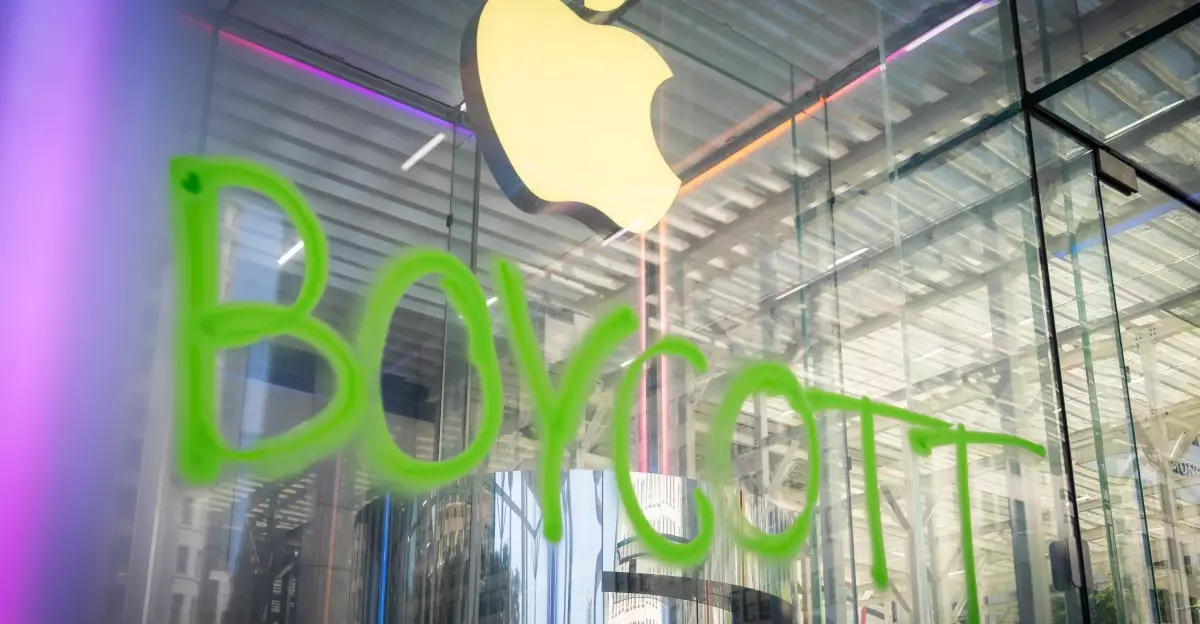In a landscape dominated by sleek branding and lofty promises of sustainability, it is easy for corporations to hide behind language that champions the environment, all the while engaging in practices that undermine their words. The recent Extinction Rebellion protest at Apple’s flagship store exemplifies this dissonance. The act of spray-painting provocative messages, such as “Tim + Trump = Toxic,” signals a profound frustration with the widening gap between corporate rhetoric and actual environmental impact. It is a bold, direct challenge, not just to Apple but to the tech industry’s tendency to champion themselves as eco-conscious leaders while continuing to prioritize growth, consumerism, and political alliances that compromise environmental integrity.
Protests like these transcend mere symbolism; they serve to expose the uncomfortable truths the public often overlooks. Behind the polished storefronts and glossy advertisements lie a complex web of commitments, broken promises, and covert alliances. When activists target the symbolism of corporate influence—highlighting figures like Tim Cook and their associations with political figures who actively roll back climate policies—they confront a systemic issue: the industry’s tendency to prioritize profits over planetary health. The spray paint that scars a store window becomes a visual banner of resistance, forcing viewers to question the authenticity of corporate environmental claims.
Corporate Alliances and the Climate Contradiction
A key element fueling this controversy is the apparent alliance between Big Tech executives and political figures whose actions directly threaten climate progress. The protest rightly points out that many of these tech giants publicly supported the Paris Agreement—an international effort to combat climate change—only to later be seen aligning themselves with administrations that dismantle these very policies. This stark contradiction underscores a dangerous pattern: corporations often adopt eco-friendly language as a strategy to appease consumers and investors, but their actions reveal a different allegiance.
The association with political figures like Donald Trump complicates the narrative further. Trump’s administration was notorious for its rollback of environmental protections, opening the floodgates for fossil fuel expansion and undermining international climate commitments. When tech leaders such as Tim Cook are seen seemingly endorsing or supporting these figures, it casts doubt on their environmental sincerity. The protest’s message, “Tim + Trump = Toxic,” encapsulates this betrayal—highlighting that behind closed doors, the industry’s efforts to address climate change are often superficial, or worse, compromised.
The Hidden Costs of Tech Growth and AI Energy Demands
Beyond superficial pledges, the environmental footprint of technology’s rapid expansion deserves critical scrutiny. The rise of artificial intelligence, cloud computing, and data-driven innovations has been accompanied by an alarming surge in energy consumption. Records reveal that tech giants like Google and Microsoft are witnessing increasing carbon emissions, contradicting their public commitments to sustainability. The expansion of data centers and AI infrastructure, which require immense amounts of electricity, threaten to nullify the gains made through renewable energy investments.
This reality brings to light a fundamental flaw: technological advancement is often sold as environmentally friendly, yet the infrastructure supporting these innovations can be more pollutive than traditional industries. The energy demands of AI and digital ecosystems call for a re-evaluation of what sustainability truly means in the digital age. It is no longer enough to focus on renewable energy investments; we must rethink growth models and the environmental costs of technological progress. The corporations’ embrace of AI as a growth engine must be critically assessed through the lens of energy consumption and environmental responsibility.
The Culture of Greenwashing and Its Consequences
Corporations have mastered the art of greenwashing—touting minor eco-friendly initiatives to distract from more damaging practices behind the scenes. While companies like Apple claim to prioritize climate action, their support for policies that expedite fossil fuel extraction and undermine climate agreements exposes a troubling double standard. This superficial commitment undermines genuine progress and erodes public trust.
The protest’s aggressive symbolism and direct critique serve as a wake-up call: superficial activism and staged green initiatives can no longer suffice in an era of unprecedented environmental crises. Authentic change requires accountability—not just hollow slogans or strategic alliances. The question remains whether corporations are willing to dismantle their own privileges and reconsider the rapid growth that fuels environmental degradation. Until then, protests will continue to serve as vital reminders that surface-level commitments are insufficient, and that true sustainability demands systemic change.
In the end, the fight over climate responsibility is also a fight over honesty and integrity in the corporate world. As long as the industry continues to prioritize appearances over actual impact, activists will feel compelled to challenge the facade—highlighting the urgent need for authentic, systemic change in how technology and business operate in harmony with our planet.

